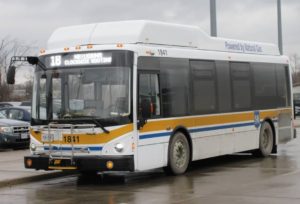 More Canadian cities are opting for transit vehicles fueled by natural gas for their public transportation fleets.The trend is gaining momentum across North America and worldwide. This is due partly to government regulations that mandate a reduction in nitrogen oxide and greenhouse gas emissions that harm air quality, and also to a heightened sense of awareness about the health threats caused by local and toxic diesel particulate emissions. On top of this natural gas are cheaper and cleaner to operate.
More Canadian cities are opting for transit vehicles fueled by natural gas for their public transportation fleets.The trend is gaining momentum across North America and worldwide. This is due partly to government regulations that mandate a reduction in nitrogen oxide and greenhouse gas emissions that harm air quality, and also to a heightened sense of awareness about the health threats caused by local and toxic diesel particulate emissions. On top of this natural gas are cheaper and cleaner to operate.
A CNG bus costs approximately $50,000 more than a diesel bus. Over a 16-year period, which is the typical service life of a Canadian transit bus, a city with a fleet of 100 CNG buses can save at least $25 million in fuel by switching from diesel to natural gas buses, and with lower maintenance costs as they don’t have to deal with problematic diesel particulate traps and associated DEF.
BC Transit serves urban regions outside of Metro Vancouver, operating in 130 communities and serving 51 million riders each year with a fleet of over 1,000 vehicles. It currently operates close to 150 CNG buses in Nanaimo, Kamloops. and Whistler. In 2019 BC Transit has decided to introduce additional CNG buses.
Grande West Transportation Group Inc. a Canadian manufacturer of mid-sized multi-purpose transit vehicles for sale in Canada and the United States, is pleased to announce that BC Transit Corporation has ordered over 30 CNG-powered Vicinity buses for approximately $13 million CAD.
Jean-Marc Landry, CEO of Grande West stated, "We are excited to be providing BC Transit with low-emission, environmentally sustainable CNG Vicinity buses for use in BC's transit systems. Adding another CNG customer further strengthens our focus on providing environmentally-friendly transit solutions."
